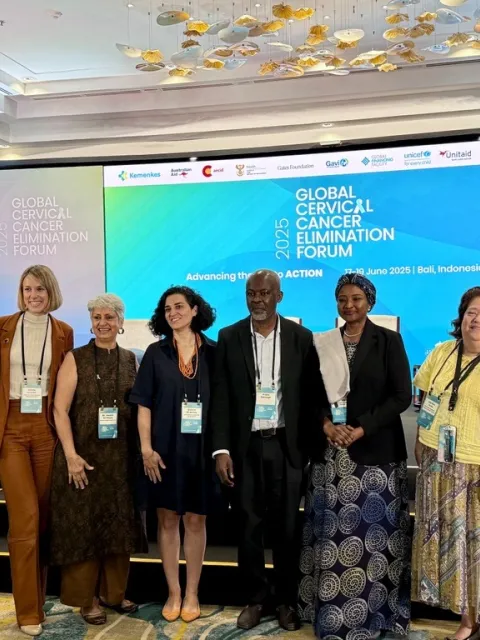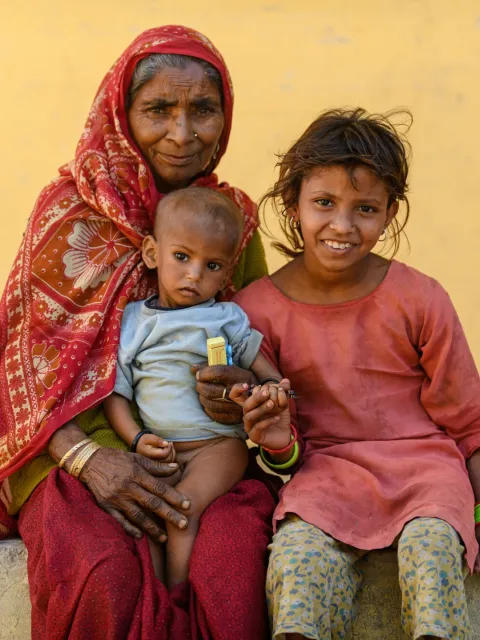The engagement of survivors is crucial to achieving the targets for cervical cancer elimination

Conference in Gabaronne, Botwana, co-organised by the Bill and Melinda Gates Foundation and the Graça Machel Trust, with the participation of cervical cancer survivors, experts and allies engaged in the fight against cancer.
Cervical cancer claimed more than 342,000 direct victims in 2020 in low and middle-income countries and created thousands of orphans, contributing to perpetuating the cycle of social inequalities.
The Global Strategy to eliminate cervical cancer was launched by the World Health Organization (WHO) in November 2020, but may not have received the attention it deserved, due to the COVID-19 pandemic that was raging worldwide at that time.
This strategy calls to fully vaccinate 90% of girls by the age of 15 against human papillomavirus, screen 70% of women by the age of 35 and again by 45 with a high-performance test, and treat 90% of women diagnosed with cervical disease (precancerous lesions and invasive cancer).
Many low- and middle-income countries are struggling to implement the guidelines outlined in the strategy, despite the fact that collectively they account for more than 8 out of 10 women diagnosed with cervical cancer and nearly 9 out of 10 who die from it globally, due to limited access to screening and treatment services.
In countries such as those of the Sahel that face security and socio-political crises associated with a scarcity of financial, technical and human resources, investing in the fight against infectious diseases such as malaria – the primary cause of morbidity in these countries – always seems paramount compared to cancers.
There are opportunities to advance cervical cancer elimination in many African countries where this disease is still taboo, and most victims are stigmatised. As has been done in the fight against HIV/AIDS, it is necessary to support the establishment of cancer survivor and/or their relatives associations, strengthen existing ones and enable their active participation in the planning and execution of programmes for cervical cancer elimination.
From 24-26 August 2023, I had the honour of participating in a conference in Gaborone, Botswana, whose objective was to develop a strategy to unite forces and highlight the experience of survivors in the elimination of cervical cancer in Africa. The event was co-organised by the Bill and Melinda Gates Foundation and the Graça Machel Trust. It witnessed the participation of cervical cancer survivors – sometimes associated with other forms of cancer or chronic diseases – as experts, and allies engaged in the fight against cancer.
Sharing the experiences of these individuals and their ‘meaningful engagement’ as ambassadors in awareness and education campaigns against cancer could have a powerful impact on primary prevention and screening. This would also improve the effectiveness of diagnostic and management strategies to optimise the therapeutic journey and the quality of life of patients.
Karen Nakawala, a cervical cancer survivor and founder of the Teal Sisters association in Zambia said in November 2020 when the Global Strategy was launched: “In conservative societies like ours, discussing topics such as cervical cancer, a gynecological problem, is difficult. Everything concerning the pelvic region is hard to address.”
We can take advantage of digital tools, however, to set up toll-free numbers, for example, or virtual or physical platforms, to inform and guide those in need, anonymously. They can also help provide support to those who wish to share their experience or suggestions the opportunity to do so, and thus contribute to the elimination strategy of cervical cancer.
Investing in the cervical cancer elimination strategy offers an opportunity to contribute to the fight against all other forms of cancer, to improve the sexual and reproductive health of girls and women, but also the health and well-being of their families. This requires, however, real political commitment and concrete actions to improve the health literacy of populations, provide comprehensive and accessible quality health prevention and care strategies, and strengthen the leadership roles of girls and women in decision-making processes.
Last update
Tuesday 23 January 2024Share this page


